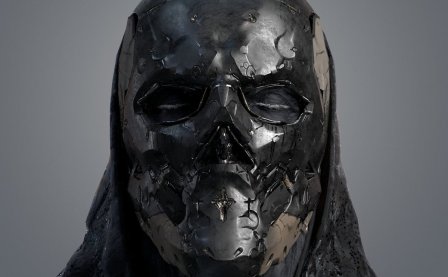Nothing is an antiseptic collage of corporate aesthetics and clean tones that does away with the ominous bass tones that once filled the cavernous empty space of his early dubstep productions. It’s also Kode9’s first album without a co-credit to Spaceape (Stephen Gordon), the gravelly-voiced vocalist whose hyperstitional incantations were a core part of Kode9’s initial project and who passed away from cancer in 2014. With this foregrounding of truly empty space — no reverb, no bass, no Spacape, no projectional emotional landscape — it earns its bleak title while also establishing itself as a project built around an n-n construction of 0 rather than the count 0 as 1 of Badiou and set theory. Negation and omission here become the productive acts, the affective charge of the album found in the impression left from an element’s absence. If earlier releases focused on a fevered imposition of the cybernetic future and its attendant human/non-human breakdown onto the present through Spaceape’s premonitory vocalizations within an mechanized dance environment primed for maximal body integration, then Nothing performs nearly the opposite operation.
It contains no imposition to dance, no exhortation, merely the embodiment of the clean lines of an idealized form of late capitalism, the machines working neatly and precisely rather than urging on the destructive call of the future. We attend to what is missing rather than what is included in such an anti-expressionistic space, a music sketched entirely in negative space. The stance of the anti-human tendency here is an utterly disinterested one, yet within that negative space emerges a weirdly direct insistence of the emotional primacy of loss. At its core, it’s hard to read Nothing without Spaceape towering over it, its blank spaces echoing with grief. When the vocalist briefly appears for “Third Ear Transmission,” the refusal of the track to take flight is foregrounded, Spaceape’s vocals filtered to mimic transmission aesthetics and distance, his verse abruptly cut off mid-phrase. While “Void” is reportedly the album’s only cut that was originally written with him in mind (here presented without vocals), his death is no more fully felt there than elsewhere — omission and elision reign through out. The concept of loss remains unarticulated, diffuse rather than pointed, environmental rather than declarative.
But Nothing is also a hollowing-out of the intense bodily charges contained in footwork’s dense rhythms — dubstep’s archetypal 2-step only arriving in fragmented and fleeting forms — the lack of bass scooping out the physical aggression of footwork’s Chicago forms and mutating it into a skittering patchwork of rhythmic interrelations that echo the working out of theoretical mathematics more so than tracing trajectories for the movement of dancing feet. It’s also a flattening-out of the transnational aesthetics of Future Brown or the Fade to Mind collective, reterritorializing their knowingly corporate-cum-anti-colonialist sonics into the neatly knitted globalist sounds, creating an unnervingly smooth sonic surface where those acts presented a deliberately heterogeneous one. In effect, it’s a dance album that foregrounds the absence of rupture as much as it does the absence of force, or of Spaceape.
And yet, despite its conceptualist sonics and firmly placid surface, Nothing still winds up as Kode9’s most unsettling and miserablist release to date, as well as his most emotionally resonant and straightforward. With the primacy of death as a motivating formal element, bubbling up through its architectural lines, mutating its space and even its fleeting moments of telegraphed “upbeat” and “danceable” sections into a tapestry of despair, it is undeniably an eulogy. But it’s also the sound of an all-consuming global aesthetic and political structure that transforms the specificities of individual narratives into fleeting trajectories within a larger assemblage, that eulogy merely a passing moment of a temporal superstructure. We’ve always known that the division between politics and aesthetics was a false one, but the corporate elements here suggest that economics itself is a superseding aesthetic structure, one that develops forms virtually on its own out of raw humanity, with death as a new element to integrate into an aesthetic plan. The weird friction here is just how personal it remains, how easy it is to toggle from the micro to the macro, from subjective empathetic mourning to a hyperrationalist inhuman perspective.
When “9 Drones” crops up as a buzzing, murky reworking of his iconic “9 Samurai,” that tension finally slips into relief, the ascendant militaristic triumphalism of the original morphing into involuted, choppy post-footwork figures. It’s a strange moment of conflicting trajectories, submission, and upward motion dancing around one another, until they drop out into the 10 minutes of near-silence of the album’s final track (“Nothing Lasts Forever”). Surface tension is restored. We’re out.
More about: Kode9, The Spaceape




